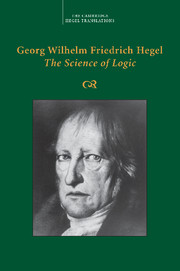Chapter 1 - Life
Published online by Cambridge University Press: 30 September 2021
Summary
The idea of life has to do with a subject matter so concrete, and if you will so real, that in dealing with it one may seem according to the common notion of logic to have overstepped its boundaries.Needless to say, if the logic were to contain nothing but empty, dead forms of thought, then there could be no talk in it at all of such a content as the idea, or life, are. But if the subject matter of logic is the absolute truth, and truth as such lies essentially in cognition, then cognition at least would have to come in for consideration. – It is common practice to have the so-called pure logic be followed by an applied logic – a logic that has to do with concrete cognition, quite apart from all the psychology and anthropology that is commonly deemed necessary to interpolate into logic. But the anthropological and psychological side of cognition is concerned with the form in which cognition appears when the concept does not as yet have an objectivity equal to it, that is, when it does not have itself as object. The part of the logic that deals with this concrete cognition does not belong to applied logic as such; if it did, then every science would have to be dragged into logic, for each is an applied logic in so far as it consists in apprehending its subject matter in forms of thought and of concepts. – The subjective concept has presuppositions that are exhibited in psychological, anthropological, and other forms. But the presuppositions of the pure concept belong in logic only to the extent that they have the form of pure thoughts, of abstract essentialities, such as are the determinations of being and essence. The same goes for cognition, which is the concept's comprehension of itself: no other shape of its presupposition but the one which is itself idea is to be dealt with in the logic; this, however, is a presupposition which is necessarily treated in logic. This presupposition is now the immediate idea; for while cognition is the concept, in so far as the latter exists for itself but as a subjectivity referring to an objectivity, then the concept refers to the idea as presupposed or as immediate. But the immediate idea is life.
- Type
- Chapter
- Information
- Georg Wilhelm Friedrich Hegel: The Science of Logic , pp. 676 - 688Publisher: Cambridge University PressPrint publication year: 2010

